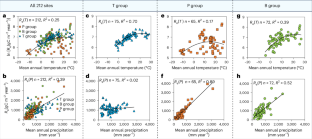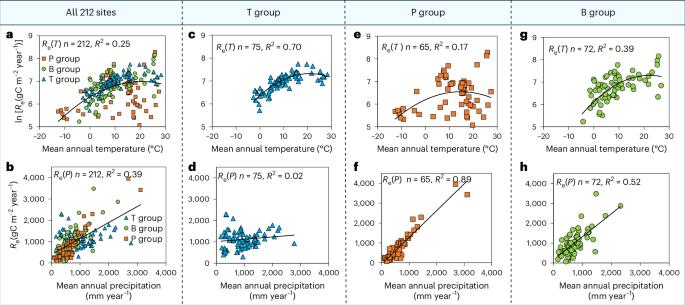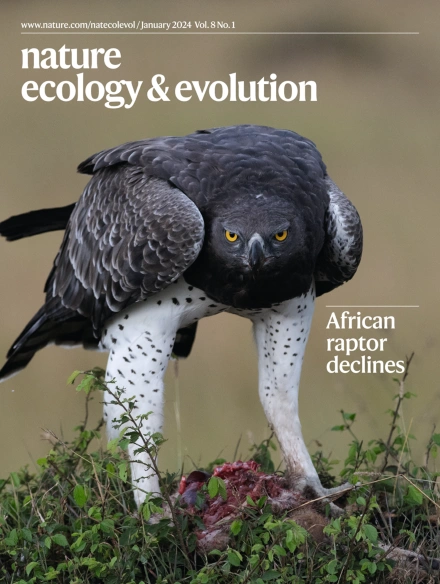Water limitation regulates positive feedback of increased ecosystem respiration
IF 13.9
1区 生物学
Q1 ECOLOGY
引用次数: 0
Abstract
Terrestrial ecosystem respiration increases exponentially with temperature, constituting a positive feedback loop accelerating global warming. However, the response of ecosystem respiration to temperature strongly depends on water availability, yet where and when the water effects are important, is presently poorly constrained, introducing uncertainties in climate–carbon cycle feedback projections. Here, we disentangle the effects of temperature and precipitation (a proxy for water availability) on ecosystem respiration by analysing eddy covariance CO2 flux measurements across 212 globally distributed sites. We reveal a threshold precipitation function, determined by the balance between precipitation and ecosystem water demand, which separates temperature-limited and water-limited respiration. Respiration is temperature limited for precipitation above that threshold function, whereas in drier areas water limitation reduces the temperature sensitivity of respiration and its positive feedback to global warming. If the trend of expansion of water-limited areas with warming climate over the last decades continues, the positive feedback of ecosystem respiration is likely to be weakened and counteracted by the increasing water limitation. Eddy covariance CO2 flux measurements across 212 globally distributed sites reveal a threshold above which ecosystem respiration is temperature limited and below which it is water limited.


水限制调节生态系统呼吸作用增加的正反馈
陆地生态系统的呼吸作用随着温度的升高而呈指数增长,构成了一个加速全球变暖的正反馈循环。然而,生态系统呼吸作用对温度的响应在很大程度上取决于水的可用性,但水的影响在何时何地很重要,目前还没有很好的定论,这给气候-碳循环反馈预测带来了不确定性。在这里,我们通过分析全球 212 个地点的涡度协方差二氧化碳通量测量数据,厘清了温度和降水(水供应的替代物)对生态系统呼吸作用的影响。我们揭示了一个降水量阈值函数,该函数由降水量和生态系统需水量之间的平衡决定,它将温度限制型呼吸作用和水分限制型呼吸作用区分开来。当降水量高于该阈值函数时,呼吸作用受温度限制,而在较干旱地区,水分限制降低了呼吸作用的温度敏感性及其对全球变暖的正反馈。如果过去几十年气候变暖导致限水区域扩大的趋势继续下去,那么生态系统呼吸作用的正反馈很可能会被不断增加的限水所削弱和抵消。
本文章由计算机程序翻译,如有差异,请以英文原文为准。
求助全文
约1分钟内获得全文
求助全文
来源期刊

Nature ecology & evolution
Agricultural and Biological Sciences-Ecology, Evolution, Behavior and Systematics
CiteScore
22.20
自引率
2.40%
发文量
282
期刊介绍:
Nature Ecology & Evolution is interested in the full spectrum of ecological and evolutionary biology, encompassing approaches at the molecular, organismal, population, community and ecosystem levels, as well as relevant parts of the social sciences. Nature Ecology & Evolution provides a place where all researchers and policymakers interested in all aspects of life's diversity can come together to learn about the most accomplished and significant advances in the field and to discuss topical issues. An online-only monthly journal, our broad scope ensures that the research published reaches the widest possible audience of scientists.
 求助内容:
求助内容: 应助结果提醒方式:
应助结果提醒方式:


